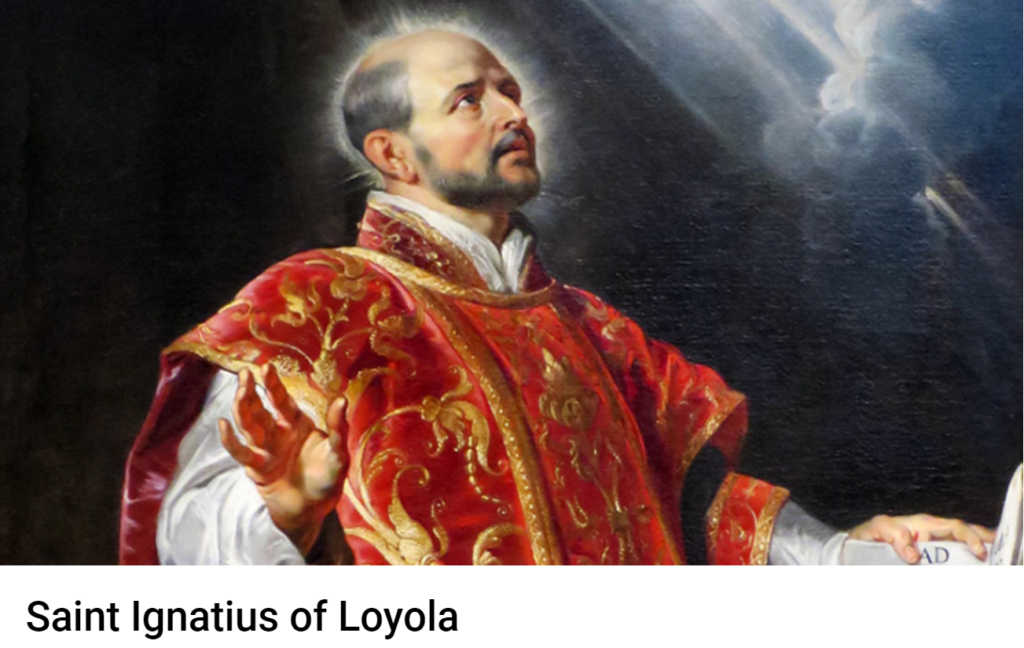

MONDAY, AUGUST 23, 2021
“May these tranquil summer days be for you and your families a special time of grace and spiritual renewal. God bless you!”
Pope Francis

416 N 2nd St, Albemarle, NC, 28001 | (704) 982-2910

Only when inner and outer authority come together do we have true spiritual wisdom. We have for too long insisted on outer authority alone, without any teaching of prayer, inner journey, and maturing consciousness. The results for the world and for religion have been disastrous. I am increasingly convinced that the word prayer, which has become a functional and pious thing for believers to do, is, in fact, a descriptor for inner experience. That is why all spiritual teachers mandate prayer so much. They are saying, “Go inside and know for yourself!” We will understand prayer and inner experience this way throughout this book. As Jesus graphically puts it, prayer is “going to your private room and shutting the door and [acting] in secret” (Matthew 6:6). Once you hear it this way, it becomes pretty obvious.
— from the book Things Hidden: Scripture as Spirituality by Richard Rohr
//Franciscan Media//


The founder of the Jesuits was on his way to military fame and fortune when a cannon ball shattered his leg. Because there were no books of romance on hand during his convalescence, Ignatius whiled away the time reading a life of Christ and lives of the saints. His conscience was deeply touched, and a long, painful turning to Christ began. Having seen the Mother of God in a vision, he made a pilgrimage to her shrine at Montserrat near Barcelona. He remained for almost a year at nearby Manresa, sometimes with the Dominicans, sometimes in a pauper’s hospice, often in a cave in the hills praying. After a period of great peace of mind, he went through a harrowing trial of scruples. There was no comfort in anything—prayer, fasting, sacraments, penance. At length, his peace of mind returned.
It was during this year of conversion that Ignatius began to write down material that later became his greatest work, the Spiritual Exercises.
He finally achieved his purpose of going to the Holy Land, but could not remain, as he planned, because of the hostility of the Turks. Ignatius spent the next 11 years in various European universities, studying with great difficulty, beginning almost as a child. Like many others, his orthodoxy was questioned; Ignatius was twice jailed for brief periods.
In 1534, at the age of 43, he and six others—one of whom was Saint Francis Xavier—vowed to live in poverty and chastity and to go to the Holy Land. If this became impossible, they vowed to offer themselves to the apostolic service of the pope. The latter became the only choice. Four years later Ignatius made the association permanent. The new Society of Jesus was approved by Pope Paul III, and Ignatius was elected to serve as the first general.
When companions were sent on various missions by the pope, Ignatius remained in Rome, consolidating the new venture, but still finding time to found homes for orphans, catechumens, and penitents. He founded the Roman College, intended to be the model of all other colleges of the Society.
Ignatius was a true mystic. He centered his spiritual life on the essential foundations of Christianity—the Trinity, Christ, the Eucharist. His spirituality is expressed in the Jesuit motto, Ad majorem Dei gloriam—“for the greater glory of God.” In his concept, obedience was to be the prominent virtue, to assure the effectiveness and mobility of his men. All activity was to be guided by a true love of the Church and unconditional obedience to the Holy Father, for which reason all professed members took a fourth vow to go wherever the pope should send them for the salvation of souls.
Reflection
Luther nailed his theses to the church door at Wittenberg in 1517. Seventeen years later, Ignatius of Loyola founded the Society that was to play so prominent a part in the Catholic Reformation. He was an implacable foe of Protestantism. Yet the seeds of ecumenism may be found in his words: “Great care must be taken to show forth orthodox truth in such a way that if any heretics happen to be present they may have an example of charity and Christian moderation. No hard words should be used nor any sort of contempt for their errors be shown.” One of the greatest ecumenists was the 20th-century German Jesuit, Cardinal Augustin Bea.
Saint Ignatius of Loyola is the Patron Saint of:
Retreats
//Franciscan Media//

Selflessness and material generosity flow from and into spiritual freedom. And this free spirit leads us unerringly out of ourselves to God who is perfect freedom and in whom and for whom we move with the uninhibited freedom of a child. We become aware that we are children of a God who loves us with a Father and Mother’s love, and everything we do becomes a gift for God, to please and thank God for being who God is to us. Gradually, the negativism and disapproval of life’s persistent critics means little at all when compared to our determination to do the will of the One who made us and redeemed us. Even our occasional ignorance of what that will is, is purified in our intention to do it as best we can.
—from the book Song of the Sparrow: New Poems and Meditations by Murray Bodo, OFM
//Franciscan Media//

“Look Busy!”
Father Peter Fitzgibbons
June 12 – 13, 2021
Gospel: Mark 4:26-34
The only thing we should have pride in is the mercy of our good Lord. From His pierced heart, flows the river of Sacramental love so that we may have life and have it to the fullest in this life and in the next. It is our means of salvation. What we should be proud of, and the only thing, is our Savior’s love. It’s not a sin or a debauchery.
Now, let me tell you what you must do to get to heaven. You have to do one thing, and it’s extraordinary. You know what it is? You may be thinking, “Oh, God! Father, please, I’m having enough problems with the ordinary stuff! What the heck are the extraordinary things?” Well, although it’s extraordinary, it’s not hard. God doesn’t ask us to do hard things. The extraordinary thing we have to do is do ordinary things ordinarily; in other words, do routine things routinely. Do the same things day after day after day.
Jesus said, “If you love Me and wish to be My follower, take up your cross every day and follow Me.” So, we take up our cross and follow Him. Now, our goal is progress…not perfection. This includes saying our prayers, not choking the you-know-what out of someone who desperately needs it, and practicing spiritual and corporal works of mercy. When I say “practicing,” I mean practicing just like doctors practice medicine. It’s not perfect, but they keep trying. Another way to carry our cross is by going to Mass every Sunday and on Holy Days, and maybe even on other days of the week. The doors are open, and on weekdays, we don’t take up a collection. So, you’re welcome to come in and get extra credit. You also can carry your cross by going to Confession once a year…every three months is better. Who wants to walk around with all that doodoo staining your soul that affects the body, mind, and spirit. You’ll have a much better attitude. We have much better vision and self-awareness when our souls are bathed in the most precious blood of Christ. These are the ordinary things we can do ordinarily…the routine things we can do routinely, and that’s the extraordinary part.
Because we do ordinary things, some may be tempted, and it’s a grave temptation, to stop, because they think that they are not progressing, they think they aren’t good at it, or they believe it’s not benefitting them. All of that is a lie by the devil. “I don’t think my medicine is helping me get well, so I’m going to stop taking it.” That’s not going to lead to a good outcome. Likewise, if we stop doing ordinary spiritual works of mercy, that also won’t lead to a good outcome. The extraordinary part is when we keep doing it and doing it…whether we enjoy it or not. We embrace the suck. I don’t enjoy eating fish. But, I have to eat it, because it was prescribed by my doctor. That’s doing an ordinary thing ordinarily. If I don’t follow my doctor’s advice, it’s a sin against the Fourth Commandment and a sin against the Fifth Commandment, because I would be endangering my life unnecessarily.
Is doing ordinary things ordinarily a lot of fun? No. “Father, you’re a professional.” Yes. “Do you always enjoy your prayers?” No. If you catch me in the morning around 7:30, I’ll be over here saying my prayers. You will notice, if you see me day after day, that I’m not walking on air. I’m not levitating. I’m not in mystical ecstasy every time I say the Rosary. I’m not always happy. Do my prayers always thrill me? Oh, heck no! Do I want to listen to one more whiner who comes in to complain? “Oh, Father, it’s too hot in church!” Oh, shut up. Do I want to listen to that? No. But, remember, everything we do should be focused on Him, our Beloved. The things we do are acts of love to our dear Lord and are not done to please ourselves. When you are tempted to stop doing ordinary things ordinarily, the focus is on you. I’m not much but I’m all I think about…that’s one of my favorite sayings. Whatever we do, whatever our gifts of love for our Lord are, big or small, they are acts of love and devotion to our Savior.
Now, as you know, in the Oval Office at the White House, there’s a phone that goes from the United States to the Soviet Union in case there is a nuclear war so that people don’t end up in a mushroom cloud. In the Vatican, there is also such a phone. Remember the bat phone? It’s kind of like that. This phone doesn’t go from the Vatican to the United States or to Russia. It goes from the Vatican to Heaven. It’s not used, but occasionally the housekeepers come along and dust it like any other piece of furniture. This phone had never rang, but, one day it did. Whoa! I doubt it was a wrong number. Everyone was too scared to touch it. No one but the pope could answer the phone, so, they found the Holy Father, brought him in, and he picked up the phone. The pope said, “Yes, Lord. Yes, Lord.” The pope smiled and put the phone down. By that time, everyone in the Vatican had gathered around. “Holiness, who was it? Speak to us!” The pope said, “It was God.” “What did He say?” The pope responded, “He’s coming back soon.” “Holiness, what should we do?” The pope answered, “Look busy!”
How will you apply this message to your life? Are you doing routine things routinely? Are you coming to weekend Mass and going to Confession at least once a year? Are you practicing corporal and spiritual works of mercy?
You can read all of Father Fitzgibbons’ sermons by going to https://annunciationcatholicalbemarle.com/ and clicking on “Blog” then “Categories” and then “Sermon Notes.” From a cell phone, click on “Blog” then “Menu” and then “Categories” (located at the end of page). There is also a search box if you are looking for a specific topic.


Humility is the hallmark spiritual virtue of letting go. It’s an open-minded, openhearted, openhanded way to move through the world. To be humble is to make room for life as it comes, without the need to grasp too tightly, even (and especially) to certainty. This kind of attitude is what keeps your vision from clouding up and occluding. No one manages this perfectly, of course. That’s why life seems all too willing to deal us periodic humiliations that knock down our towers of Babel and drop us back onto the ground of our being: the truth that we are held in divine and loving hands, without being able to do anything to deserve or ruin it.
— from the book Making Room: Soul-Deep Satisfaction through Simple Living
by Kyle Kramer
//Franciscan Media//

You don’t need a lot of elaborate statistics to know that there are billions of people who are suffering crushing poverty at this very moment. If you start to pay attention, you feel this inside yourself. We may often distract ourselves or deny it, but there’s no getting around the fact that we are connected in more ways and to a greater extent than we can ever fathom. The deeper we go in our spiritual practice, the more obvious and undeniable these connections become.
Being present to the poor through friendship, solidarity, and service isn’t just a helpful set of moral principles. It’s a virtuous circle, with each feeding and amplifying the others, and all leading to a more authentic way of being in the world. Because when we make room for these in our life, we’re making room for love, the common bond that can bridge any gulf poverty may create.
— from the book Making Room: Soul-Deep Satisfaction through Simple Living
by Kyle Kramer
//Franciscan Media//


Jesus didn’t promise his early disciples a life of luxury and ease. Instead, he told them they would have to let go of pretty much everything in order to follow him. The early monastics pared their life down to the barest of essentials out in the deserts of Egypt and Syria. Beloved St. Francis of Assisi let go of his prospects as a middle-class Italian cloth merchant and pledged his allegiance to Lady Poverty instead. Why? Why does letting go seem to be such a necessary element in the equation of transformational spirituality? One answer is as simple as it is painful: because if life inevitably entails loss, and if true spirituality is about fully embracing the (often messy) reality of life, then any authentic spiritual path must make room for loss. Otherwise, spirituality really is just an opiate for the masses or a form of bypass, leading us away from life’s mystery rather than into the heart of it.
— from the book Making Room: Soul-Deep Satisfaction through Simple Living
by Kyle Kramer